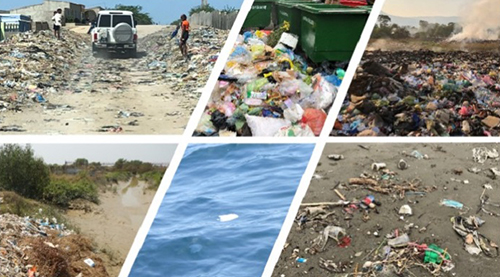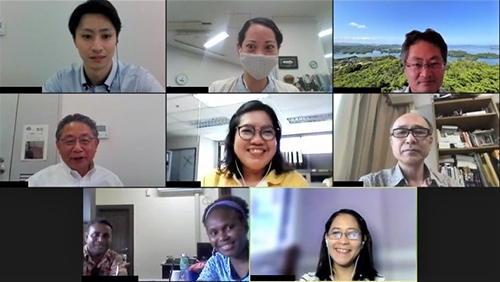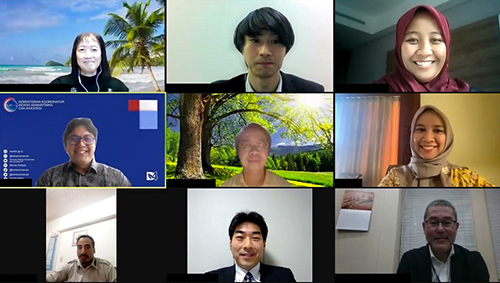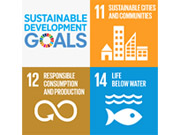- Home
- About JICA
- Organization
- Domestic Offices
- Yokohama Center
- Topics & Events
- [Report] Knowledge Co-Creation Program "Waste Management towards Control of Marine Litter"(Online program) Saving the marine environment together!
Topics & Events
March 22, 2022
[Report] Knowledge Co-Creation Program "Waste Management towards Control of Marine Litter"(Online program)
Saving the marine environment together!
In recent years, marine litter problems have been drawing attention around the world. To join the global efforts towards the problems, JICA conducted an online program for government officials, business persons, and NGO staffs working on marine litter countermeasures in developing countries.
The participants of the program shared wide range of relevant information and experiences; Japan's waste management administration and good practices and contribution to the world by private companies, NGOs, and universities, and efforts of each participating country. Such mutual learning process helped the participants (including the Japanese participants and lecturers) deepen their understanding of the complex characteristics of marine litter issues and get some hints on what to do and how to collaborate. As a result, the participants were able to examine various methods to improve marine litter countermeasures in their own countries, including the establishment of institutional arrangements, promoting involvement of residents, and initiatives by universities.
Despite the time difference (some of the participants had more than 12 hours difference), many participants actively participated in the sessions by introducing their own country's initiatives, and had a series of intensive discussions. Particularly, regarding raising people's awareness, the participants shared the issues they were facing in their countries and introduced good examples each other, which led to increase their expectations to the success of the program. In addition, information exchange across the regions/countries brought "intellectual synergy effect" in the program.
There are several encouraging comments from the participants, such as"I want to work on improving the system based on the advice from the lecturers and other participants! We would like to keep in touch with each other as a team working on marine litter prevention around the world!" The participants will continue to work together with the people in the developing countries to achieve a clean and healthy global environment.



International trends related to marine plastic litter
| Time | Outline |
|---|---|
| September 2015 | Target 14.1 of the SDGs, " prevent and significantly reduce marine pollution of all kinds, particularly from land-based activities, including marine debris and nutrient pollution " was set. |
| January 2016 | At the annual meeting of the World Economic Forum in Davos, a report by the Ellen MacArthur Foundation warned that by 2050, the amount of plastic in the oceans will exceed the amount of fish (by weight). |
| May 2016 | The G7 Ise-Shima Summit Leaders' Declaration reaffirmed the need to address marine litter while also recognizing that resource efficiency and 3R initiatives will contribute to reducing and curbing the generation of marine litter, especially plastic, from land-based sources. |
| July 2017 | The G20 Hamburg Summit agreed to launch the G20 Action Plan on Marine Litter. |
| June 2018 | The G7 Charlevoix Summit endorsed the Charlevoix Blueprint for Healthy Oceans and Resilient Coastal Communities. Canada and European countries endorsed the Marine Plastics Charter, committing to specific numerical targets, including the goal of recovering all plastics by 2040. |
The marine litter issue has been drawinng attention in recent years, especially in the context of the international trends mentioned above.
With this in mind, for the purpose of gaining a comprehensive understanding of the marine plastic litter problem and considering more effective support policies, JICA has been conducting surveys in five Asian countries (China, Indonesia, Thailand, the Philippines, and Vietnam). Adding to this, JICA has established a Center of Excellence (COE) in Thailand in order to accumulate scientific knowledge and develop a survey and research system, and to promote multifaceted efforts such as implementing various training programs.
JICA has set forth a policy of contributing to the realization of "Clean Cities" in developing countries by promoting cross-sectoral and comprehensive environmental management, mainly in urban areas, as the "JICA Clean City Initiative (JCCI). As part of this initiative, we will promote effective measures related to marine litter control.
Countries participating in the program in Japanese fiscal year 2020:
22 participants from Azerbaijan, Belize, Brazil, Dominican Republic, Egypt, El Salvador, Kenya, Maldives, Marshall Islands, Mexico, Philippines, Solomon Islands, South Africa, Sri Lanka, St. Lucia and Thailand,
Countries participating in the program in Japanese fiscal year 2021:
12 participants from Brazil, Dominican Republic, Egypt, El Salvador, Indonesia, Jamaica, Marshall Islands and Vietnam,
(Collaboration in editing) IDEA Consultants, Inc.
Contributions to Sustainable Development Goals(SDGs)

The 2030 Agenda for Sustainable Development (the 2030 Agenda) is a set of international development goals from 2016 to 2030, which was adopted by the UN Sustainable Development Summit held in September 2015. The 2030 Agenda listed "Sustainable Development Goals" consisting of 17 goals and 169 targets in order to eradicate poverty and realize a sustainable world.
This Knowledge Co-Creation program is expected to contribute in achieving the following goals of 17 SDG;
The 11th goal: "Make cities and human settlements inclusive, safe, resilient and sustainable"
The 12th goal: "Ensure sustainable consumption and production patterns"
The 14th goal: "Conserve and sustainably use the oceans, seas and marine resources for sustainable development"
"Promote peaceful and inclusive societies for sustainable development, provide access to justice for all and build effective, accountable and inclusive institutions at all levels"
- About JICA
- News & Features
- Countries & Regions
- Our Work
- Thematic Issues
- Types of Assistance
- Partnerships with Other Development Partners
- Climate Change / Environmental and Social Considerations
- Evaluations
- Compliance and Anti-corruption
- Science and Technology Cooperation on Global Issues
- Research
- JICA Development Studies Program / JICA Chair
- Support for the Acceptance of Foreign HRs / Multicultural and Inclusive Community
- Publications
- Investor Relations
